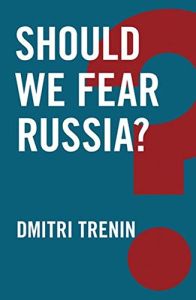
Recommendation
Russia and the Western world eye one another with no shortage of suspicion. To the West, strongman Vladimir Putin seems a bit too keen to restore the Soviet glory days – and, if necessary, to run roughshod over his neighbors. Meanwhile, the Russians resent the West for not giving them more credit for peacefully winding down the Cold War or treating them as a “great power” in its aftermath. In this balanced study, Russia expert Dmitri Trenin unpacks the past quarter-century of relations between Moscow and the West. His bottom line: the rest of the world need not fear Russia unduly, but it is something like a caged bear that they would be wise not to poke. Trenin provides a readable and perceptive analysis of the West’s fears, Moscow’s present mindset and the ways today’s regime of “authoritarian kleptocracy” differs from the Soviet state of yesteryear. This slim volume is especially useful when it describes Russia’s deep longing for relevance on the world stage – insight Western leaders would do well to understand.
Summary
About the Author
Dmitri Trenin is the director of the Carnegie Moscow Center.


















Comment on this summary